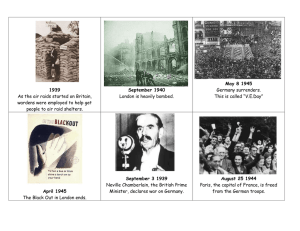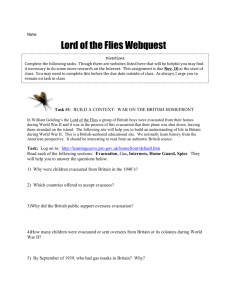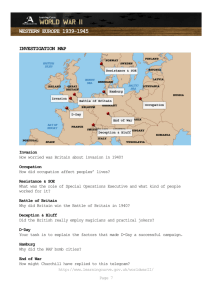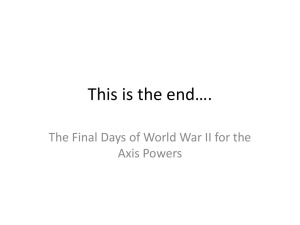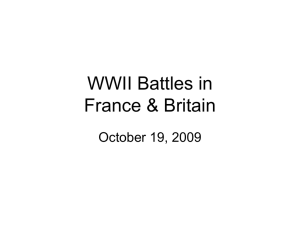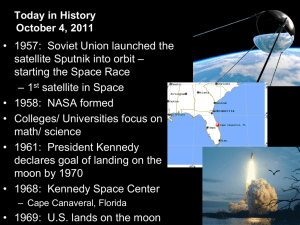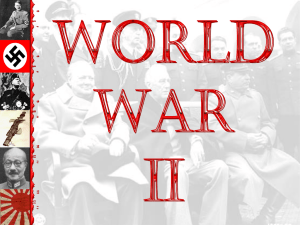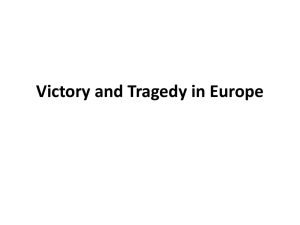A Time in ^° HISTORY 19
advertisement
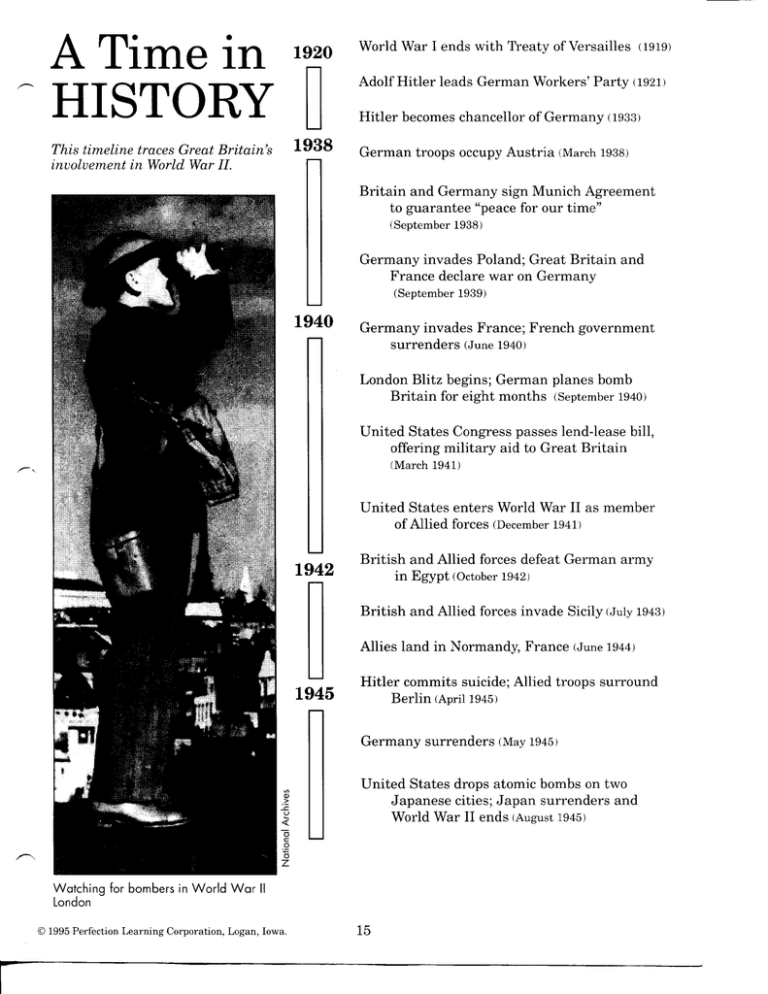
A Time in 19^° HISTORY World War I ends with Treaty of Versailles (1919) This timeline traces Great Britain's involvement in World War II. German troops occupy Austria (March 1938) Adolf Hitler leads German Workers' Party (1921) Hitler becomes chancellor of Germany (1933) Britain and Germany sign Munich Agreement to guarantee "peace for our time" (September 1938) Germany invades Poland; Great Britain and France declare war on Germany (September 1939) 1940 Germany invades France; French government surrenders (June 1940) London Blitz begins; German planes bomb Britain for eight months (September 1940) United States Congress passes lend-lease bill, offering military aid to Great Britain (March 1941) United States enters World War II as member of Allied forces (December 1941) 1942 British and Allied forces defeat German army in Egypt (October 1942) British and Allied forces invade Sicily (July 1943) Allies land in Normandy, France (June 1944) 1945 Hitler commits suicide; Allied troops surround Berlin (April 1945) Germany surrenders (May 1945) United States drops atomic bombs on two Japanese cities; Japan surrenders and World War II ends (August 1945) Watching for bombers in World War II London © 1995 Perfection Learning Corporation, Logan, Iowa. 15 Goldin: WAR William Golding's experiences in the British Navy during World War II changed his view of human nature. Lord of the Flies expresses his new vision. In the following interview with Jack Biles, Golding responds to the question "What occurred during the war that changed your thinking?" I don't think I can answer that question, except in general terms and by putting it this way: in a way one saw during the war much more... what happened. All this has nothing to do, directly, with Nazis or anything; it has much more to do with people. One had one's nose rubbed in the human condition. It is too easy a thing to say that before the war I believed one thing and after the war I believed another. It was not like that. I was gradually coming up against people and I was understanding a bit more what people were like; and, also gradually, learning that things I hadn't really believed, that I had taken as propaganda, were, in fact, done. This kind of thing, for example: only about Mr. Golding, like fifteen miles down there [near Bowerchalke], meeting some everyone else you people who were working on the drops into France, the occuhad heard the pied territory; going there twice—meeting a man one time reports in Germany and the next time not meeting him, and being told that he was probably being tortured to death at that moment. This and you were kind of thing one gradually began to see, and, at the end, I literally unable to fully believed in [the fact of] Nazism; one couldn't do anything believe them. What else. Finally, there were films of it, and there it was. I had to equate that, on the one side, with what I knew happened in the about people, on the other side. Now it would be terribly flatwar that changed tering to me to make out that I suddenly saw how horrific people could be, as compared to the nice people I had known your mind? for the last five years [of the war, Golding's term of service], Jack Biles but it wasn't so. I had seen enough in the last five years to ^^^"^ know that [the "nice people"] are capable of that, too; that really this was an extension of the human condition; that what the Nazis were doing, they were doing because certain capacities in them, certain deficiencies, certain anything you like in them, had been freed, and they were just people like us, in different circumstances. So I saw that it was no good saying, "Well, fine. America, Britain, France, China, have all won. Against the dirty swine." Because I just didn't believe it. I saw that humanity had been fighting against itself in a kind of endless war. But what had been fighting and what had been doing all these things? On the whole, only on the whole—I wouldn't like this to be misunderstood, as I'm sure it would be—if you could take the people out of the concentration camps and make concentration-camp guards of them, the situation would not be altered materially. Can you see at all what I'm talking about? 18 © 1995 Perfection Learning Corporation, Logan, Iowa.
